Samsung SSD XP941 Review: The PCIe Era Is Here
by Kristian Vättö on May 15, 2014 12:00 PM ESTPerformance Consistency
Performance consistency tells us a lot about the architecture of these SSDs and how they handle internal defragmentation. The reason we don’t have consistent IO latency with SSD is because inevitably all controllers have to do some amount of defragmentation or garbage collection in order to continue operating at high speeds. When and how an SSD decides to run its defrag or cleanup routines directly impacts the user experience as inconsistent performance results in application slowdowns.
To test IO consistency, we fill a secure erased SSD with sequential data to ensure that all user accessible LBAs have data associated with them. Next we kick off a 4KB random write workload across all LBAs at a queue depth of 32 using incompressible data. The test is run for just over half an hour and we record instantaneous IOPS every second.
We are also testing drives with added over-provisioning by limiting the LBA range. This gives us a look into the drive’s behavior with varying levels of empty space, which is frankly a more realistic approach for client workloads.
Each of the three graphs has its own purpose. The first one is of the whole duration of the test in log scale. The second and third one zoom into the beginning of steady-state operation (t=1400s) but on different scales: the second one uses log scale for easy comparison whereas the third one uses linear scale for better visualization of differences between drives. Click the buttons below each graph to switch the source data.
For more detailed description of the test and why performance consistency matters, read our original Intel SSD DC S3700 article.
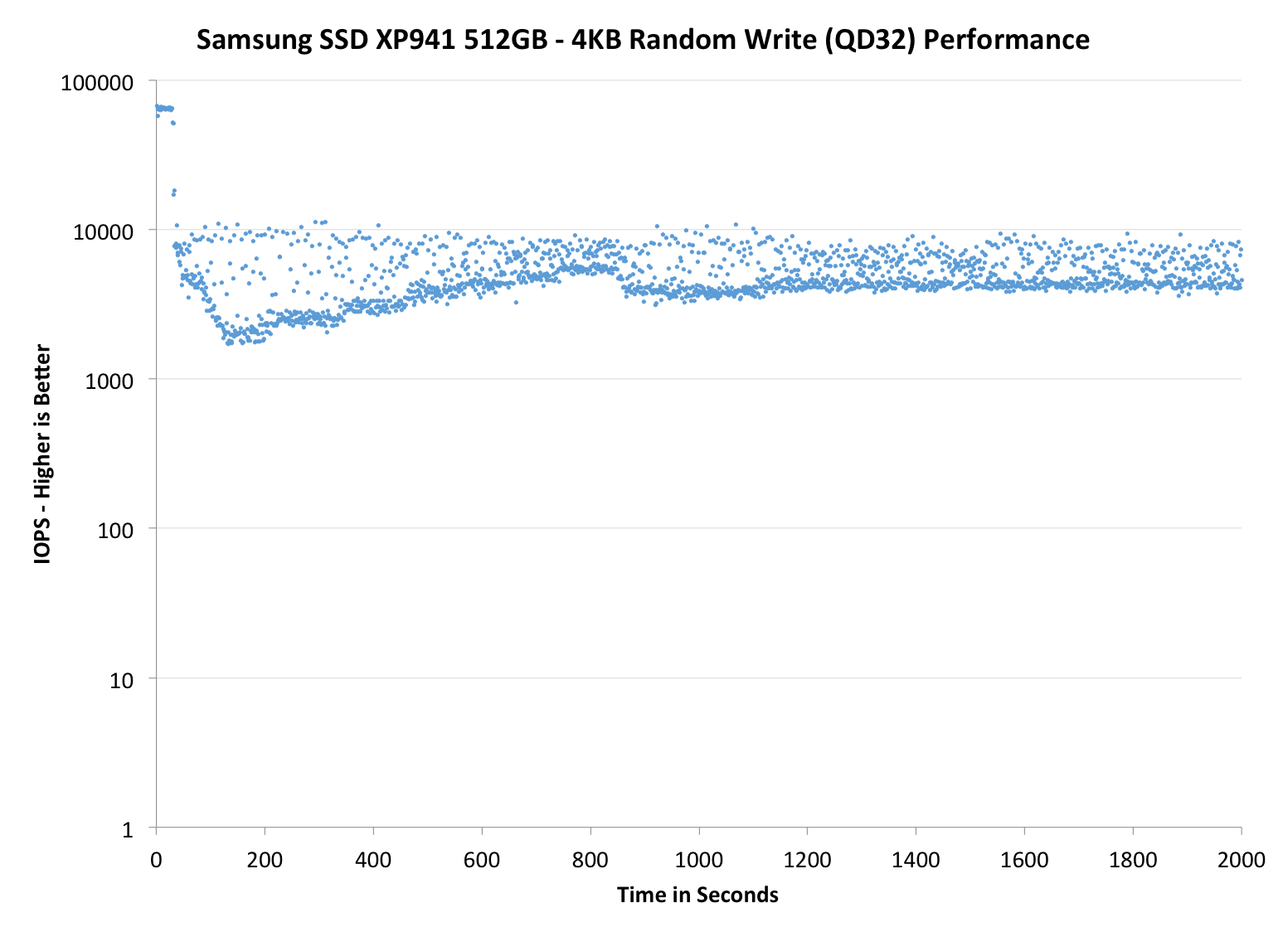 |
|||||||||
| Samsung SSD XP941 | Plextor M6e | Samsung SSD 840 Pro | SanDisk Extreme II | Samsung SSD 840 EVO mSATA | |||||
| Default | |||||||||
| 25% Spare Area | |||||||||
The interface has never been the bottleneck when it comes to random write performance, especially in steady-state. Ultimately the NAND performance is the bottleneck, so without faster NAND we aren't going to see any major increases in steady-state performance.
The graphs above and below illustrate this as the XP941 isn't really any faster than the SATA 6Gbps based 840 Pro. Samsung has made some tweaks to their garbage collection algorithms and overall the IO consistency gets a nice bump over the 840 Pro but still, this is something we've already seen with SATA 6Gbps SSDs. I wouldn't say the IO consistency is outstanding because the Plextor M6e does slightly better with the default over-provisioning (both drives have ~7%) but if you increase the over-provisioning the XP941 will show its magic.
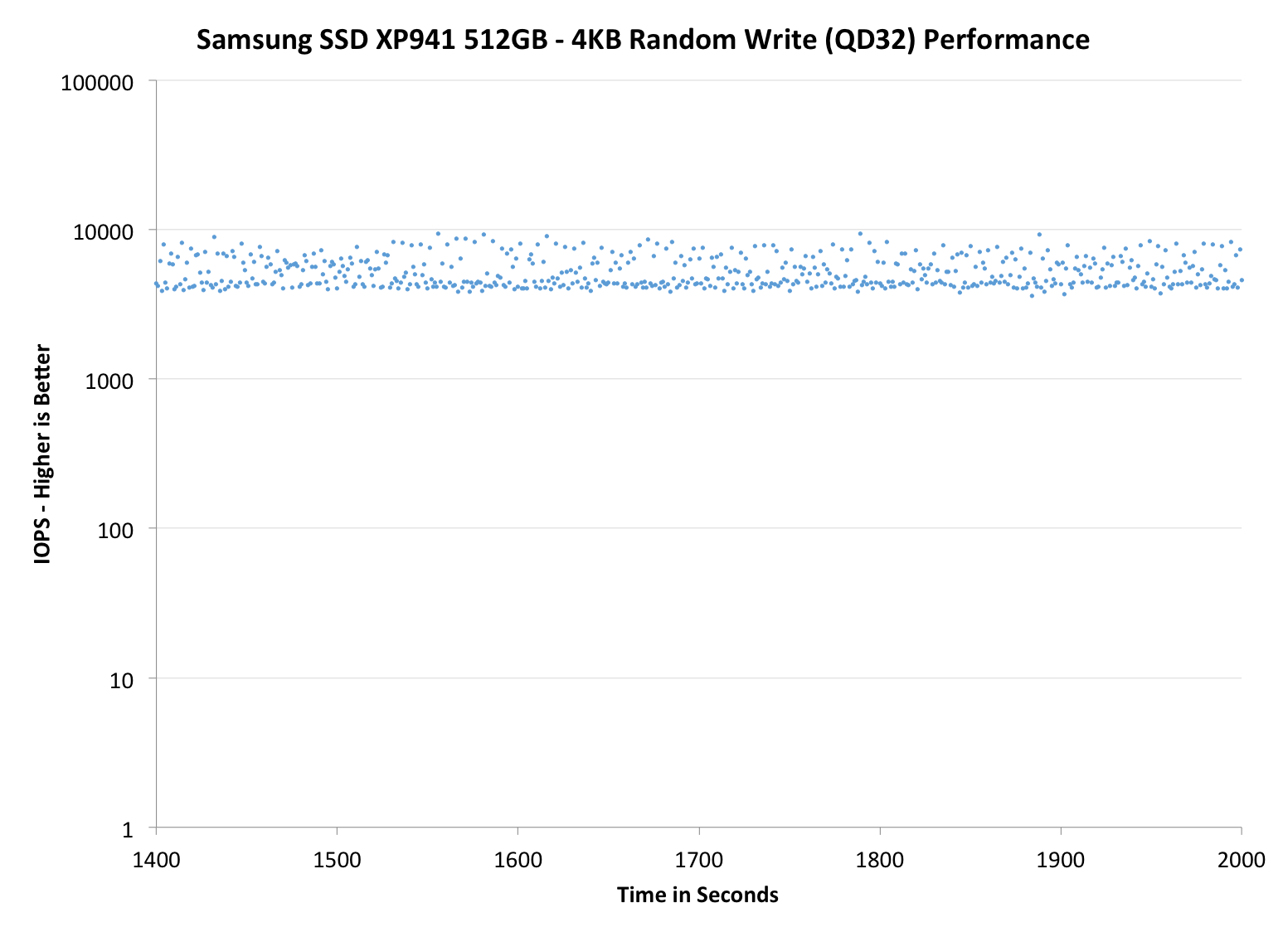 |
|||||||||
| Samsung SSD XP941 | Plextor M6e | Samsung SSD 840 Pro | SanDisk Extreme II | Samsung SSD 840 EVO mSATA | |||||
| Default | |||||||||
| 25% Spare Area | |||||||||
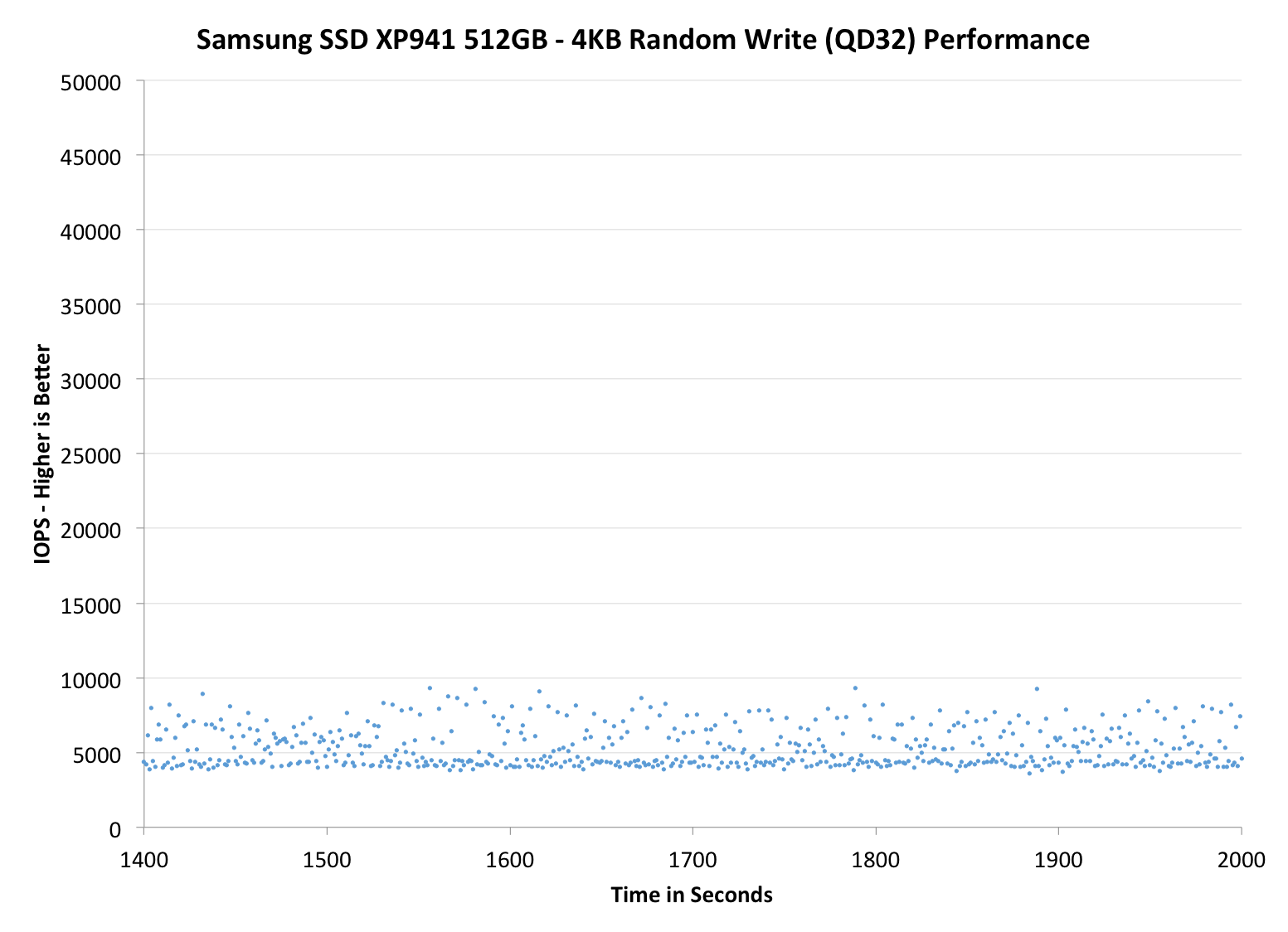 |
|||||||||
| Samsung SSD XP941 | Plextor M6e | Samsung SSD 840 Pro | SanDisk Extreme II | Samsung SSD 840 EVO mSATA | |||||
| Default | |||||||||
| 25% Spare Area | |||||||||
TRIM Validation
Update 5/20: I got an email from one of our readers suggesting that the TRIM issue might be related to Windows 7 and that Windows 8 should have functioning TRIM for PCIe SSDs. To try this, I installed Windows 8.1 to a secondary drive and ran our regular pre-conditioning (fill with sequential data and torture with 4KB random write for 60 minutes). To measure performance, I had to rely on Iometer as HD Tach didn't work properly under Windows 8. I ran the same 128KB sequential write test that we usually run (QD=1, 100% LBA) but extended the length to 10 minutes to ensure that the results are steady and not affected by burst performance.
| Samsung SSD XP941 512GB - Iometer 128KB Sequential Write (QD1) | ||
| Clean | After TRIM | |
| Samsung SSD XP941 512GB | 607.7 MB/s | 598.9 MB/s |
And TRIM seems to function as it should, so it indeed looks like this is just a Windows 7 limitation, which is excellent news.
------------------------
To test TRIM, I took a secure erased XP941 and filled it with sequential data, followed by a 60-minute torture with 4KB random writes (QD32). After the torture, I TRIM'ed all user-accessible LBAs and ran HD Tach to produce the graph below:
It looks like TRIM isn't functional, although I'm not that surprised. I'm waiting to hear back from Samsung about whether this is a limitation in the operating system because I've heard that Windows doesn't treat PCIe drives the same even if they utilize the same AHCI software stack like the XP941 does. If that's true, we'll need either updates to Windows or some other solution.
In a Mac TRIM support is listed as "yes" when TRIM is enabled for third party drives using TRIM Enabler, though I didn't have the time to verify if it actually works.


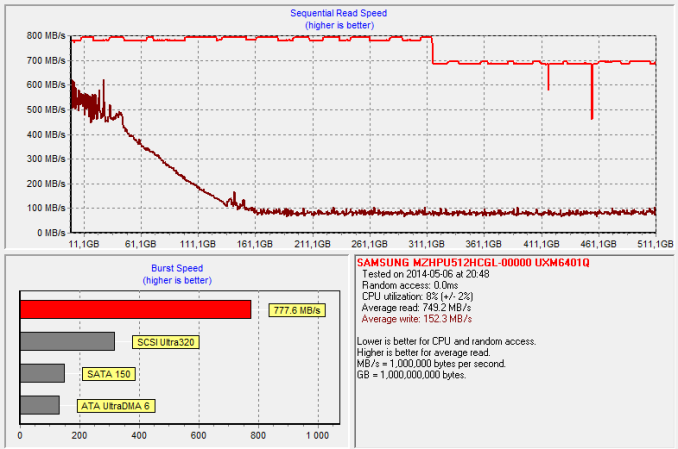
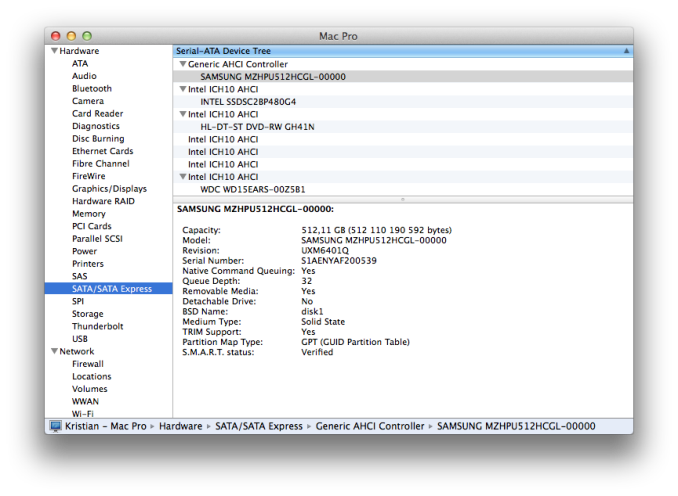








110 Comments
View All Comments
TelstarTOS - Saturday, May 17, 2014 - link
like basroil said.Shadowmaster625 - Thursday, May 15, 2014 - link
They need to stop being greedy. Compared to Samsung's own SSD 840 Pro, it has less parts, so it should cost them less to produce it. Yet the price is double? That makes it a pointless product, especially if it cant even beat an 840 pro at random I/O.dstarr3 - Thursday, May 15, 2014 - link
First generation product on a mostly new interface. There's some R&D to be paid for.JohnBooty - Thursday, May 15, 2014 - link
It's a niche first-gen product, with R&D costs. If ten or twenty engineers, testers, and managers spend a year on this that's easily a few million dollars in R&D right there. Probably more in the tens of millions of R&D, all told.nathanddrews - Thursday, May 15, 2014 - link
People still think this way?JeffFlanagan - Thursday, May 15, 2014 - link
On the Internet you can find people who think in any way possible, or don't think at all. No matter how insane, foolish, and disconnected from reality a belief is, there are hundreds or thousands of people who will believe it. See the countless Republican fake outrages and religion as extreme examples of the phenomena.purerice - Thursday, May 15, 2014 - link
JF, keep politics and gender studies professors' talking points out of this, please. Up till then you had a good point.darwinosx - Thursday, May 15, 2014 - link
You just told us your own political opinions silly boy.Anyway
Apple has been using PCIE SSD's for two generations of Macs now which oddly was not mentioned in this article. Samsung and I think Toshiba have been making them for Apple which probably explains why this one booted from a Mac.
yaedon - Thursday, May 15, 2014 - link
@JF: A well-respected tech blog like Anandtech is no place to vent your opinions of politics or religion. There are plenty of political and religious blogs available on the internet if you feel compelled to discuss those topics.critical_ - Thursday, May 15, 2014 - link
@purerice & @yaedon: I've never understood the desire to squelch these comments in a nation that values free speech. If you don't like it then don't read it (and don't respond).